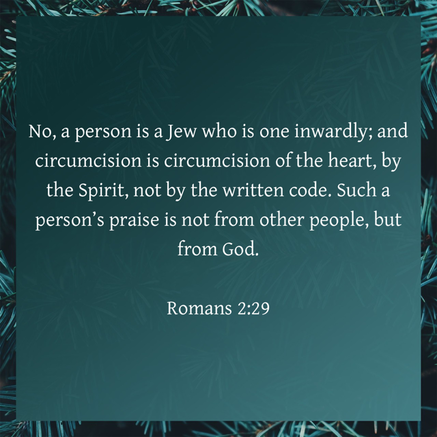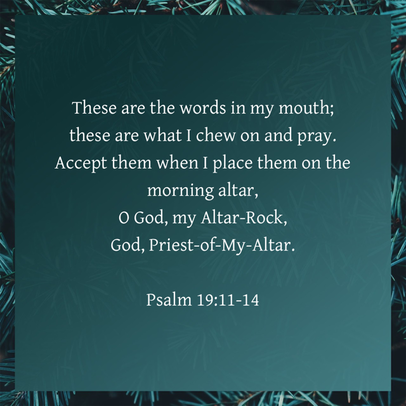|
Happy New Year!
Good morning! We're so glad that you've decided to start the new year by studying God's word with us!
When we meet together, we take time to share our joys and concerns. Consider your past week. If you have any prayer requests, you can share them in the comments on this post. When you are ready, use the prayer below (source) to get started.
Father God, we gather here today under your care and protection. Thank you for your lovingkindness that never fails us. We thank you for those with us, that you would guide our thoughts and actions to bring you glory. Strengthen us and fill us with your peace. May we love and serve each other as Jesus has shown us. Fill us with the Holy Spirit to do your good work on earth. Amen.
Today's lesson is on 2 Chronicles 7:12-22.
God Promises to Hear and Forgive
At the beginning of chapter 7 it describes how King Solomon prayed for the acceptance of the temple and fire came down from heaven and consumed the burnt offering and the sacrifices and the glory of the Lord filled the temple. This was a dramatic and visible proof of God's approval. King Solomon offered a sacrifice of twenty-two thousand bulls and one hundred and twenty thousand sheep. Each animal was ritually sacrificed and a portion was dedicated to the Lord and a portion given to the priest and the people. God still had to be honored through blood sacrifice, both of atonement and as a demonstration of fellowship with God. It had been said that no height attained, no work done, no blessings received is in itself sufficient to ensure our continuance in favor. Nothing but continued fidelity.
Verse 12 - 13
God choosing a permanent home within Jerusalem cemented the promised land as the place he had chosen for Israel. Until this point, God had been content with the tabernacle. The temple that Solomon built replaced the tabernacle as the center of worship in Israel, signified by the relocation of the Ark of the Covenant to the temple. The temple was important but the Lord was not dependent on the people having a temple in their midst for him to be present with them. God named some punishments for turning away from him. Drought is caused by an extended period of no rain. At the opposite end of this spectrum, we expect flooding, but locusts can also represent the devastation of very wet conditions. Locusts are a subset of grasshoppers. These insects experience a drastic change when heavy rains fall. Instead of being solitary creatures of little impact in their “grasshopper phase," the locusts enter a “gregarious phase,” finding each other and swarming crops in groups as large as tens of billions of the flying insects. They can destroy thousands of square miles of farmland, bringing famine in their wake. The last punishment that was mentioned was a Plague. We should note that hardships can and do occur without being punishment from God. We should be wary of those who declare such and such a disaster to be what “those people” had coming to them. Instead we all ought to repent of our own sins. Verse 14 The actions listed are necessary for the people to be renewed as those called by God's own name. First, humility allows us to acknowledge when we have wronged God and one another. There is something naturally humble in true prayer because it recognizes that the answers are not in self and they are in God. God promises something special to humble praying people today. Second, prayer can be specifically of repentance, but its true importance is in renewing the relationship with the Lord. Only God can replace the “heart of stone” to “a heart of flesh”. Everything we do in turning toward God is simply what opens the door for renewal. It wasn't enough to merely turn their hearts to God, they must turn their lives to God. Verse 16 The temple's consecration did not come about by the human rituals of prayer and sacrifice but by God's own divine action. By choosing to meet Israel at the temple, God made it holy. And while God would not literally live in this temple, allowing the temple to be associated with his Name meant he was tying his reputation to the temple and to his people who worshiped there. Adding that God's heart would be in the temple speaks both to the care and the attention that God would give his people. We can think of this in the parallel way that Christians are God's chosen temple. Our mode of conduct reflects on our holy God who has chosen us as his people and the dwelling place of the Holy Spirit. Verse 17 -18 David your father was an apt role model for Solomon. When David sinned, he humbled himself, prayed, sought God's face and turned from his sinful ways. For this reason, we see over and over again that God did not hold David's sins against him, even when the man experienced the effects of his failings. The promise to maintain David's family on the throne of Israel was both conditional and unconditional. It was unconditional in the sense that God would preserve the dynasty even when its rulers practiced idolatry and unjust behaviors. However, Solomon's own sins resulted in 10 of the 12 tribes being taken from his son Rehoboam. And when Judah fell to Babylon in 586 BC, the monarchy was destroyed. The failure of line was attributed to the kings' unfaithfulness. The land and people could be restored, but it would be several centuries before a new kind of king from David's line would take up the crown. How God chose to keep this promise to David was greater than anyone in the Chronicle's day could anticipate. Jesus would live as a man and be proclaimed in his rightful place as king over the entire world. Verse 19-22 This verse shifts from Solomon to the people as a whole. While all sin severs the relationship between Israel and God, the root of many sins is idolatry – allowing some non-god to take God's place. False gods' ways are never God's ways, and in fact these imaginary gods often demand or condone wickedness. Worshiping any God but the Lord violates the first two commandments and ensures that a people will be led farther to forsake God's decrees and commands. The result of Judah's continued idolatry was exile. There is a certain logic to this: if people desire to put something else in God's place, they may find that God allows them to have what they desire, knowing that it is not what is really needed. The sins of Israel polluted the land so God took the people away to allow healing to begin. 2 Chronicles 36:21. One consequence of exile would be finding that God's destroyed temple and by extension - his exiled people would become a byword and object of ridicule. Israel's exile would serve as an example of how God disciplines sinful people. If Israel obeyed, He would bless them so much that others had to recognize the hand of God upon Israel. If Israel disobeyed, he would chastise them so severely that the nations would be astonished at the judgment of God among His disobedient people, and they would know the Lord has brought calamity on them. This response emphasizes Israel's ingratitude for their deliverance from Egypt. Israel's core identity came from the Lord who chose them and liberated them from Egyptian bondage. Worshiping and serving other gods was a rejection of what God had done. Outsiders who saw what happened in Israel would explain it as a disaster from the Lord.
Conclusion – God's Forgiveness
While sin has consequences, often dire, neither sin nor its consequences can utter the final word about the relationship between chosen people and the choosing God. Even when sin seems to have ruined God's plan entirely – as with the apostasy of the Davidic line – we do well to remember that God's promise and plans move forward. The loss of David's kingdom led to the greatest gift of all: salvation through Jesus' blood, bringing us out of our exile in sin and into God's kingdom. We cannot anticipate how God will choose to work through our exilic experiences. Still, when asking for God's mercy, we must remember our own responsibility: to humble ourselves, to offer honest prayer, and to seek God's face as we turn from evil. He honors our repentance when we honor him. Prayer O God who hears and sees, to you we turn when our sins consume us. Please forgive and heal us. In Jesus' name we pray. Amen Thought to remember Repent to experience forgiveness and healing.
Questions:
Benediction
Our benediction today is from the New International Version.
Next week's lesson is on Isaiah 43:1-4, 10-12.
0 Comments
Leave a Reply. |
AuthorWe are a small, rural Presbyterian church in southwestern Pennsylvania. Archives
July 2024
Categories
All
|



 RSS Feed
RSS Feed